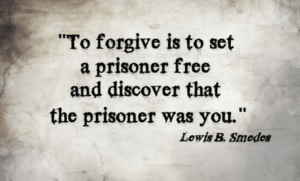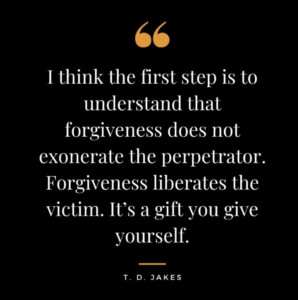As my editor and I were discussing possible topics for the upcoming post, I mentioned that one of the things most on my mind was the recent death of a close childhood friend. Grieving his death had been particularly difficult since we’d had some “unfinished business” that I’d no longer be able to work out with him. My editor suggested I consider writing a post about forgiveness—it is certainly a relevant subject and it might even help me process my feelings.
It seemed like a good suggestion, but as I tried writing several times, I never made it beyond the second page. The more I tried, the greater my resistance grew. It gradually became clear to me that I needed to at least try to identify what was driving my resistance. It isn’t as if I was resistant to the idea of forgiving—far from it! I’m a big believer in forgiveness.
 Now, that wasn’t always true. I didn’t even always understand forgiveness. As a kid I remember adults making it sound so simple. I remember when a kid in my class spread some baseless rumor about me, Miss Ready made him stand up in the class and explain that what he said wasn’t true. She then asked if I would forgive him. I said I would. Actually, I didn’t feel I had a choice, standing there in front of the class. To this day I don’t know if I truly forgave him, or if I even knew what that really meant. At church, too, they said to forgive “seventy times seven” but never told how. Forgiveness is a lot more complicated than most of us realize or want to admit.
Now, that wasn’t always true. I didn’t even always understand forgiveness. As a kid I remember adults making it sound so simple. I remember when a kid in my class spread some baseless rumor about me, Miss Ready made him stand up in the class and explain that what he said wasn’t true. She then asked if I would forgive him. I said I would. Actually, I didn’t feel I had a choice, standing there in front of the class. To this day I don’t know if I truly forgave him, or if I even knew what that really meant. At church, too, they said to forgive “seventy times seven” but never told how. Forgiveness is a lot more complicated than most of us realize or want to admit.
I was 22 when I got an unexpected master class on the subject. I was traveling as a clown with Circus Kirk that summer in between my freshman and sophomore years at York College. It was difficult for me to leave since we had two shows a day, six days a week. I did manage to get home for a few days. My mother’s heath was very poor, and I decided I was going to end my tour with the circus and stay at home to be with her. I remember her words to me like it was yesterday.
“I haven’t seen you have so much fun as you have had this summer traveling with the circus to a different town each day, meeting new people, making life-long friends and making hundreds of people laugh each day as you live out one of your many dreams, to be a clown on a circus! If you want to really make me happy, finish out your summer with the circus and then we will have some time together before you return to college.”
I remember being very uncomfortable returning to the circus but didn’t feel I had a choice. Mom was a caretaker who always put others’ needs above her own. Less than two weeks later, she died! I was devastated. Besides losing a mother, I had lost my closest confidant and most ardent supporter. I was way beyond sad and it felt like the grieving would never end.
In September, I returned to York College and proceeded to immerse myself in my studies, working two jobs and running cross country. One day I stopped in the office to visit with one of my favorite professors who always made time for me.
Not long into our conversation she asked, “Do you want to talk about whatever it is that you have been carrying around since this semester began? You have gone from a major contributor in the classroom last semester to being invisible.”
I shared that my mother had died in the summer, what she meant to me, and my struggle to deal with it. As I described the circumstances around her death, I explained that because of the cost, she hadn’t gone to the doctor to manage her diabetes and had died of complications. “My mother took care of everyone around her and did it well but really didn’t care for herself.”
The tears began and my professor-turned-therapist just sat there quietly and let it unfold. Even though men from the coal region weren’t allowed to cry, I somehow wasn’t embarrassed in the presence of that caring, insightful person.
After my tears stopped, she quietly said, “You seem very angry at your mother for always putting others, including yourself, first, and not taking better care of herself.”
I felt the small office begin to close in on me and for a few seconds I had a strong urge to get out of that space! How could I be angry at a person I loved so much, who was dead? Surely that wasn’t possible, was it? I desperately wanted to deny her assumption but couldn’t find the words. Just more tears!

Photo by Priscilla Dupreez : Unsplash.com
Finally, after another long silence she said softly, “Your mother’s unconscious decision to basically set aside her own medical issues as she cared for everyone around her ended up robbing you both of many more years of relationship, precious time together. Your anger is understandable. As we sort that through, I expect we will discover there was no negative intention on your mothers part. I sense much of her self-worth was tied up in her taking care of others and she didn’t see herself worthy of self-care. My guess is you are presently stalled in the grieving process because you are finding it difficult to forgive your mother, it’s especially hard to do that when the person has died.”
This simple statement gave me so much to unpack! Not only did she help me acknowledge my anger but she gave me “permission” to feel that way, assuring me it was normal and nothing to be ashamed of. Then she gave me some tools to help move toward forgiveness, like focusing on intentions and seeing how my mother’s own journey played into her actions. All of these helped me let go of my anger at my mother, and have served me well ever since.
Over the years, I have become something of a student of forgiveness. I learned that forgiveness doesn’t mean saying that what they did was okay or even that the relationship needs to be restored or continued. It isn’t about the other person; it is about you. One of my favorite quotes, which has been a game changer for me, is from Lewis B. Smedes: “To forgive is to set a prisoner free and discover that prisoner was you.”
Another powerful insight came from a person we are just beginning to fully appreciate, Fred Rogers. “Forgiveness is a strange thing. It can sometimes be easier to forgive our enemies then our friends. It can be hardest of all to forgive people we love.”
And writer David Small is credited with saying, “To understand someone else as a human being, I think, is about as close to real forgiveness as one can get.” What that means to me is that practicing forgiveness, especially those that are most challenging, helps us develop more empathy and compassion toward others and ultimately strengthens our relationships.
As a therapist, I have counseled countless patients to forgive and have seen firsthand the benefits (as well as the disastrous effects of not forgiving!). And personally, I have done a fair amount of forgiving over the years and certainly have received much more forgiveness than I gave.
So, given all of this, why was I so resistant to writing a post on forgiveness? What was holding me back?
It finally dawned on me that some of the resistance was rooted in the fact that I am not as far along as I “should” be—as I would like to be, anyway—in forgiving my dear friend who died. I have more work to do to fully let go of my unexpressed anger and hurt. How can I write a post about forgiveness if I can’t practice what I preach? Wouldn’t that be hypocritical?
But then I realized that maybe I needed to offer myself a little more compassion and forgiveness. Because there is something else I’ve learned about forgiveness. It doesn’t matter how much you believe in it, how many times you’ve done it in the past, or even how much you want to do it—forgiveness is a process that happens on its own timeline. While there are things we can do to help, there is no formula that ensures that it will take place quickly—or even at all.
I would love to be able to report that in the course of writing this post I reached the end of my journey toward forgiveness and attained the peace of mind and heart it offers. But that simply isn’t the case. I’m still in the middle of it and may be for a while. All I can say is that I’m on my way, putting one foot in front of the other, trusting that I will arrive someday.
QUESTIONS FOR DEEPENING THE JOURNEY
- Do you remember the earliest messages you received regarding forgiveness? How have they served you over the years? What has been your history with giving and receiving forgiveness?
- Have you ever felt abandoned, hurt, or angry at someone who left you, either intentionally or not (i.e. through death)? How did you process those feelings without being able to talk with them directly? Was your approach successful?
- Has your difficulty or inability to forgive someone left you a prisoner to some extent? What are the consequences of holding onto anger? Do you ever get angry with yourself for not being able to forgive?
- Do you agree with Fred Rogers that it is often more difficult to forgive those closest to us? Why or why not?
- Did you or do you presently have someone in your life like my professor who makes time for you, genuinely listens, and is willing to give you loving feedback? Do you strive to be that person for those around you, even if they are not in your intimate circle?
- Resistance is often a sign that there is something we need to look at. Can you identify something you resisted lately or are presently? Does your resistance tell you anything about yourself?
- Is there presently someone that you struggle to forgive? Does considering intentions and/or that person’s journey and battles help? What else could you do to move forward?
Banner photo by: Hasan Almasi on Unsplash.com



Terry,
Happy New Year to you and Rita! I always get something useful from your blog.
Tony
Terry, I haven’t replied to the posts you send lately and for that I am sorry. You have always found a way to make anyone who listens to you or reads what you write take a deeper dive not who and what they are. This post will take some time for me to digest and even begin to answer the questions you have posed. In the meantime be well brother, best to you and your wife, and if you would say a prayer for myself and the congregation I am serving. These last two years have been difficult in so… Read more »
Forgiveness is tough. I’m reminded of the saying that holding onto anger is like drinking poison to harm the person with whom you are angry. It affects no one but you. The idea of forgiving as a gift to yourself is a positive way of thinking about the effects of anger. I like it. We all have unfinished business with our relationships, past and present, and your musings will prod me to think more deeply about that. All the best my friend to you and yours.
Terry,
What an interesting subject, especially after dealing for 2 years with a pandemic and the anger that exists in our communities.
The hardest for me is when someone close diesI have learned that it helps me to talk out loud to the person when I’m all alone. After I spill my heart to them about my grief and anger, I reply (out loud) to myself, saying what I think the person might say in response. It becomes a dialogue and seems to help me process the anger and perhaps see things from both sides a bit better. Forgiveness is not easy, especially, it seems, when it involves those you love the most. I had forgotten all about Circus Kirk! Blast from… Read more »
The hardest person to forgive is ourselves…… It is a process that takes time, so glad our saviour does it so well!
Terry, once again you amaze me with your wisdom and ability to articulate the topics you address, so eloquently. “Amaze” doesn’t mean “surprise”, it’s more like “envy.” Personally, I don’t think of anyone I need to forgive. Thankfully, I’ve been treated pretty well for the past 82 years. But I do think of situations in which I feel some degree of guilt for (mostly) unintentionally hurting someone else. That goes back to the age of five when I threw another child’s skate key in the bushes. So, I have this list in my heart of people whose forgiveness I wish… Read more »